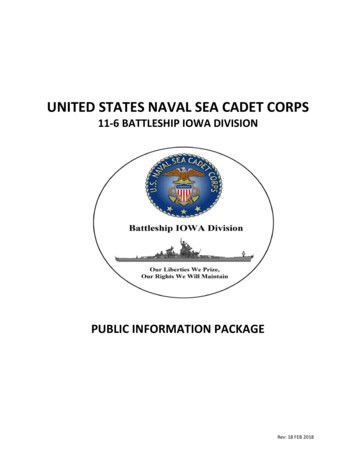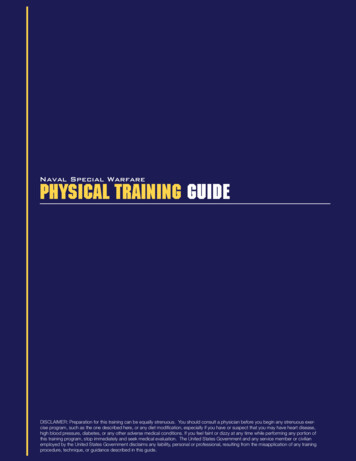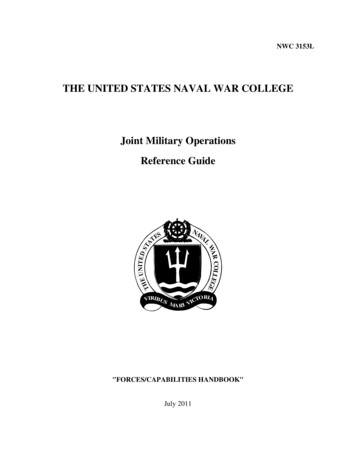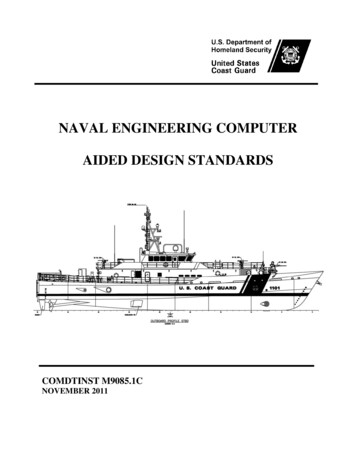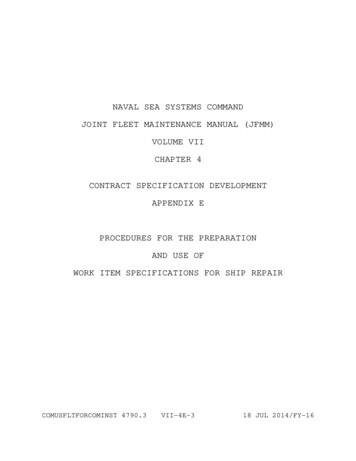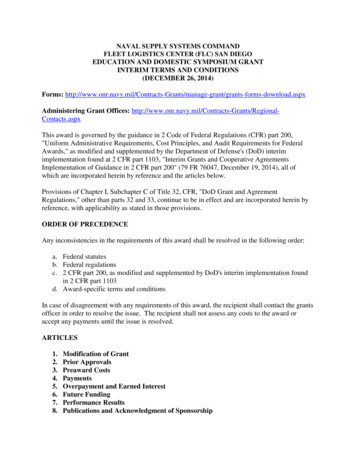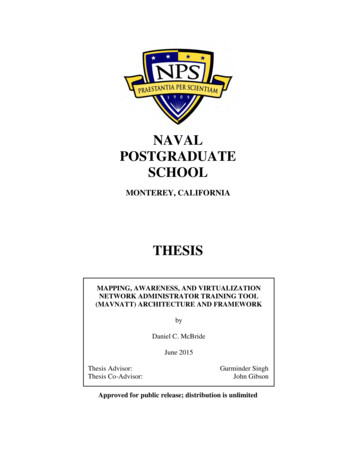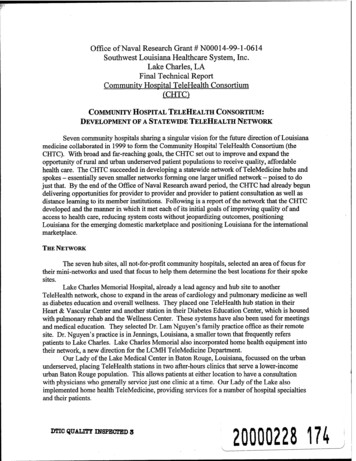
Transcription
THE ALMANACK OF NAVAL RAVIKANT
T H E A L M A N A C K O F N A VA L R A V I K A N TERIC JORGENSON
Copyright 2020 Eric JorgensonAll rights reserved.The Almanack of Naval RavikantA Guide to Wealth and HappinessIS B N 978-1-5445-1422-2 Hardcover978-1-5445-1421-5 Paperback978-1-5445-1420-8 EbookThis book has been created as a public service. It is available forfree download in pdf and e-reader versions on Navalmanack.com.Naval is not earning any money on this book. Naval has essays,podcasts and more at Nav.al and is on Twitter @Naval.
FOR MY PARENTS, WHO GAVE MEE V E R Y T H I N G A N D A LWAYS S E E M TOF I N D A WAY TO G I V E M O R E .
CONTENTSIMPORTANT NOTES ON THIS BOOK (DISCLAIMER)FOREWORDERIC’S NOTE (ABOUT THIS BOOK)TIMELINE OF NAVAL RAVIKANTNOW, HERE IS NAVAL IN HIS OWN WORDS PART I: WEALTHBUILDING WEALTHUnderstand How Wealth Is CreatedFind and Build Specific KnowledgePlay Long-Term Games with Long-Term PeopleTake on AccountabilityBuild or Buy Equity in a BusinessFind a Position of LeverageGet Paid for Your JudgmentPrioritize and FocusFind Work That Feels Like PlayHow to Get LuckyBe PatientBUILDING JUDGMENTJudgmentHow to Think ClearlyShed Your Identity to See RealityLearn the Skills of Decision-MakingCollect Mental ModelsLearn to Love to 06114
PART II: HAPPINESSLEARNING HAPPINESSHappiness Is LearnedHappiness Is a ChoiceHappiness Requires PresenceHappiness Requires PeaceEvery Desire Is a Chosen UnhappinessSuccess Does Not Earn HappinessEnvy Is the Enemy of HappinessHappiness Is Built by HabitsFind Happiness in AcceptanceSAVING YOURSELFChoosing to Be YourselfChoosing to Care for YourselfMeditation Mental StrengthChoosing to Build YourselfChoosing to Grow YourselfChoosing to Free YourselfPHILOSOPHYThe Meanings of LifeLive by Your ValuesRational BuddhismThe Present Is All We 83187193194196198202BONUSNAVAL’S RECOMMENDED READINGBooksOther RecommendationsNAVAL’S WRITINGNEXT ON NAVALAPPRECIATIONSOURCESABOUT THE AUTHOR207208221223227229233241
IMPORTANT N OTESON THIS BOOK(DISCL AIMER)I built the Navalmanack entirely out of transcripts, Tweets,and talks Naval has shared. Every attempt is made to presentNaval in his own words. However, there are a few importantpoints. The transcripts have been edited for clarity and brevity(multiple times). Not all sources are primary (some excerpts are from otherwriters quoting Naval). I can’t be 100 percent certain of every source’s authenticity. Concepts and interpretations change over time, medium,and context. Please verify phrasing with a primary source before citingNaval from this text. Please interpret generously.By definition, everything in this book is taken out of context.Interpretations will change over time. Read and interpret genI mportant N otes O n T his B ook ( D isclaimer ) · 9
erously. Understand the original intent may be different thanyour interpretation in a different time, medium, format, andcontext.In the process of creating this book, I may have mistakenlyre-contextualized, misinterpreted, or misunderstood things.As content passed through time, space, and medium, somephrasing may have shifted in flight. Every effort has been madeto maintain the original intent, but errors are (very) possible.Interviews have been transcribed, edited, rearranged, andre-edited for readability. I did my best to keep Naval’s ideasin his own words.All brilliance in this book is Naval’s; any mistakes are mine.TWEETS AND TWEETSTORMSTweets are formatted like pull quotes but are unique content.I use them to summarize or punctuate an idea from the mainprose.This formatting shows I’m quoting a tweet.Tweetstorms are connected tweets, formatted like this:10 · T H E A L M A N A C K O F N A V A L R A V I K A N T
This is the first tweet in a tweetstorm. This is the second tweet. Tweetstorms are longer series oftweets all threaded together, similar to a blog post.BOLDED QUESTIONSMany excerpts are from interviews by fantastic creators likeShane Parrish, Sarah Lacy, Joe Rogan, and Tim Ferriss. Thequestions are bolded. For simplicity and continuity, I do notdistinguish various interviewers from each other.NON-NARRATIVEThis is a choose-your-own adventure book. Jump to anythingthat interests you and skip anything that doesn’t.LOOK IT UPIf you find a word or concept you’re not familiar with, look itup. Or, read on to find more context. Some referenced ideasare expanded upon later in the book.CITATIONSCitations (like [1]) indicate the end of an excerpt. I’ve done mybest to maintain context for smooth reading. Sources are inthe appendix for reference. Some sources appear many timesand do not appear in order.I mportant N otes O n T his B ook ( D isclaimer ) · 1 1
F OREWORDBY T I M F E R R I S SDear Reader,It feels strange for me to write these words, as I committedmany years ago to never write forewords.I’m making a rare exception in this case for three reasons. First,a free version of this book is being offered to the world in adigital/Kindle/eBook format with no strings attached. Second,I’ve known Naval for more than a decade and have long wantedsomeone to compile this book. Third, I’m increasing the likelihood of Naval’s next child being named “Tim” (I’ll settle for“Timbo,” if he prefers).Naval is one of the smartest people I’ve ever met, and he’s alsoone of the most courageous. Not in the “run into the fire without thinking twice” sense, but in the “think twice and then telleveryone they’re focusing on the wrong fire” sense. He is rarelypart of any consensus, and the uniqueness of his life, lifestyle,family dynamics, and startup successes is a reflection of conscious choices he’s made to do things differently.F oreword · 1 3
He can be as blunt as a foot to the face, but that’s part of what Ilove and respect about him: you never have to guess what Navalis thinking. I’ve never had to guess how he’s feeling about me,someone else, or a situation. This is a huge relief in a world ofdouble-talk and ambiguity.We’ve shared a lot of meals, shared a lot of deals, and hoppedaround the world together. That’s all to say that, while I consider myself a good people-watcher, I consider myself anexcellent Naval-watcher. He is one of the people I call mostfor advice, and I’ve watched him in many habitats throughmany seasons: easy times, hard times, recessions, booms—you name it.Sure, he’s the CEO and a co-founder of AngelList. Sure, hepreviously co-founded Vast.com and Epinions, which wentpublic as part of Shopping.com. Sure, he’s an angel investorand has invested in many mega successes, including Twitter,Uber, Yammer, and OpenDNS, to name but a few.That’s all great, of course, and it shows Naval is a world-classoperator instead of an armchair philosopher.But I don’t take his perspectives, maxims, and thoughts seriously because of the business stuff. There are lots of miserable“successful” people out there. Be careful about modeling those,as you will get all the bathwater with the baby.I take Naval seriously because he: Questions nearly everything Can think from first principles Tests things well14 · T H E A L M A N A C K O F N A V A L R A V I K A N T
Is good at not fooling himselfChanges his mind regularlyLaughs a lotThinks holisticallyThinks long-termAnd doesn’t take himself too goddamn seriously.That last one is important.This book will give you a good taste of what that cocktail ofbullets looks like in Naval’s head.So, pay attention but don’t simply parrot his words. Followhis advice but only if it holds up after scrutiny and stresstesting in your own life. Consider everything but take nothingas gospel. Naval would want you to challenge him, as long asyou bring your A-game.Naval has changed my life for the better, and if you approachthe following pages like a friendly but highly competent sparring partner, he might just change yours.Keep your hands up and your mind open.Pura Vida,Tim FerrissAustin, TexasF oreword · 1 5
ERIC ’S N OTE (A BOUTTHIS BOOK)Throughout his career, Naval has generously shared hiswisdom, and millions of people around the world follow hisadvice on building wealth and living happily.Naval Ravikant is an icon in Silicon Valley and startup culturearound the world. He founded multiple successful companies(Epinions during the 2000 dot-com crash, AngelList in 2010).Naval is also an angel investor, betting early on companies likeUber, Twitter, Postmates, and hundreds more.More than a financial success, Naval has been sharing his ownphilosophy of life and happiness, attracting readers and listeners throughout the world. Naval is broadly followed because heis a rare combination of successful and happy. After a lifetimeof study and application of philosophy, economics, and wealthcreation, he has proven the impact of his principles.Today, Naval continues to build and invest in companies almostcasually, in his own artistic way, while maintaining a healthy,peaceful, and balanced life. This book collects and organizesE ric ’ s N ote ( A bout T his B ook ) · 1 7
the pieces of wisdom he has shared and shows you how toachieve the same for yourself.Naval’s life story is instructive. An introspective founder,self-taught investor, capitalist, and engineer certainly hassomething to teach us all.As a first-principles thinker with no fear of speaking his truth,Naval’s thoughts are often unique and thought-provoking. Hisinstinct for seeing through life’s veneer has changed how I seethe world.I’ve learned an enormous amount from Naval. Reading, listening,and applying his principles of wealth and happiness has givenme calm confidence on my path and taught me to enjoy everymoment of this journey. Closely studying his career has shownme how great things are accomplished through small, persistentsteps, and how large an impact one individual can have.I refer to his work often and recommend it to friends. Thoseconversations inspired me to create this book, so people canlearn from his perspective whether they’re new to Naval’s ideasor have followed him the past ten years.This book collects the wisdom shared by Naval over the pastdecade in his own words through Twitter, blog posts, and podcasts. With this book, you can get the benefits of a lifetime ina few hours.I created this book as a public service. Tweets, podcasts, andinterviews quickly get buried and lost. Knowledge this valuable deserves a more permanent, accessible format. That ismy mission with this book.18 · T H E A L M A N A C K O F N A V A L R A V I K A N T
I hope this acts as an introduction to Naval’s ideas. I’ve collected his most powerful and useful ideas in his own words,woven them into a readable thread, and organized those intosections for easy reference.I often find myself reviewing sections of this book beforemaking an investment or opening to the Happiness chapter ifI’m feeling off. Creating this book has changed me. I feel moreclarity, confidence, and peace through all aspects of life. I hopereading it will do the same for you.The Almanack is intended as a guide to be read and consultedfor specific topics. If Naval doesn’t answer your emails, I hopethis book gives you the next-best advice.This book is an introduction to Naval and dives deeply into histwo most-explored topics: wealth and happiness. If you wantto continue exploring Naval and his other ideas, I encourageyou to check out the “Next on Naval” section at the end of thisbook. I’ve shared chapters that were edited out of the finalbook, as well as other popular resources.Be well,EricE ric ’ s N ote ( A bout T his B ook ) · 1 9
TIMELINE OFN AVAL RAVIKANT 1974 - Born in Delhi, India1985 - Age 9 - Moved from New Delhi to Queens, NY1989 - Age 14 - Attended Stuyvesant High School1995 - Age 21 - Graduated Dartmouth (studied computerscience and economics)1999 - Age 25 - Founder/CEO of Epinions2001 - Age 27 - Venture Partner at August Capital2003 - Age 29 - Founder of Vast.com, a classified ad marketplace2005 - Age 30 - Is called “Radioactive Mud” in Silicon Valley2007 - Age 32 - Founded Hit Forge, a small VC fund originally conceived as an incubator2007 - Age 32 - Launched VentureHacks blog2010 - Age 34 - Launched AngelList2010 - Age 34 - Invested in Uber2012 - Age 36 - Lobbied Congress to get the JOBS Act passed2018 - Age 43 - Is named “Angel Investor of the Year”T imeline of N aval R avikant · 2 1
N OW, HERE IS N AVALIN HIS OWN WORDS N ow , here is N aval in his own words · 2 3
BACKGROUNDI grew up in a single-parent household with my mom working,going to school, and raising my brother and me as latchkeykids. We were very self-sufficient from a very early age. Therewas a lot of hardship, but everyone goes through hardship. Itdid help me in a number of ways.We were poor immigrants. My dad came to the US—he was apharmacist in India. But his degree wasn’t accepted here, sohe worked in a hardware store. Not a great upbringing, youknow. My family split up. [47]My mother uniquely provided, against the background of hardship, unconditional and unfailing love. If you have nothingin your life, but you have at least one person that loves youunconditionally, it’ll do wonders for your self-esteem. [8]We were in a part of New York City that isn’t very safe. Basically,the library was my after-school center. After I came back fromschool, I would just go straight to the library and hang outthere until they closed. Then, I would come home. That wasmy daily routine. [8]We moved to the US when we were very young. I didn’t havemany friends, so I wasn’t very confident. I spent a lot of timereading. My only real friends were books. Books make for greatfriends, because the best thinkers of the last few thousandyears tell you their nuggets of wisdom. [8]My first job was with an illegal catering company in the backof a van delivering Indian food when I was fifteen. Even whenI was younger, I had a paper route and I washed dishes in thecafeteria.24 · T H E A L M A N A C K O F N A V A L R A V I K A N T
I was a totally unknown kid in New York City from a nothingfamily, an “immigrants trying to survive” situation. Then, Ipassed the test to get into Stuyvesant High School. That savedmy life, because once I had the Stuyvesant brand, I got into anIvy League college, which led me into tech. Stuyvesant is oneof those intelligence lottery situations where you can break inwith instant validation. You go from being blue collar to whitecollar in one move. [73]At Dartmouth, I studied economics and computer science.There was a time when I thought I was going to be a PhD ineconomics. [8]Today, I’m an investor, personally, in about two hundred companies. Advisor to a bunch. I’m on a bunch of boards. I’m alsoa small partner in a cryptocurrency fund because I’m reallyinto the potential of cryptocurrencies. I’m always cooking upsomething new. I always have a bunch of side projects. [4]All that, of course, in addition to being the founder and chairman of AngelList. [4]I was born poor and miserable. I’m now pretty well-off, andI’m very happy. I worked at those.I’ve learned a few things, and some principles. I try to lay themout in a timeless manner, where you can figure it out for yourself. Because at the end of the day, I can’t quite teach anything.I can only inspire you and maybe give you a few hooks so youcan remember. [77]N ow , here is N aval in his own words · 2 5
Live, on Twitter, it’s Naval (applause ensues )On May 18th, 200726 · T H E A L M A N A C K O F N A V A L R A V I K A N T
PART IWEALTHHow to get rich without getting lucky.
BUILDIN G WEALTHMaking money is not a thing you do—it’s a skill you learn.B uilding W ealth · 2 9
UNDERSTAND HOW WEALTH IS CREATEDI like to think that if I lost all my money and you dropped meon a random street in any English-speaking country, withinfive or ten years I’d be wealthy again because it’s just a skillsetI’ve developed that anyone can develop. [78]It’s not really about hard work. You can work in a restauranteighty hours a week, and you’re not going to get rich. Gettingrich is about knowing what to do, who to do it with, and whento do it. It is much more about understanding than purely hardwork. Yes, hard work matters, and you can’t skimp on it. Butit has to be directed in the right way.If you don’t know yet what you should work on, the mostimportant thing is to figure it out. You should not grind at alot of hard work until you figure out what you should be working on.I came up with the principles in my tweetstorm (below) formyself when I was really young, around thirteen or fourteen.I’ve been carrying them in my head for thirty years, and I’vebeen living them. Over time (sadly or fortunately), the thing Igot really good at was looking at businesses and figuring outthe point of maximum leverage to actually create wealth andcapture some of that created wealth.This is exactly what I did my famous tweetstorm about. Ofcourse, every one of these tweets can be extrapolated into anhour’s worth of conversation. The tweetstorm below is a goodstarting point. The tweetstorm tries to be information-dense,very concise, high-impact, and timeless. It has all the information and principles, so if you absorb these and you work hardover ten years, you’ll get what you want. [77]30 · T H E A L M A N A C K O F N A V A L R A V I K A N T
How to Get Rich (Without Getting Lucky): Seek wealth, not money or status. Wealth is having assetsthat earn while you sleep. Money is how we transfer timeand wealth. Status is your place in the social hierarchy. Understand ethical wealth creation is possible. If you secretlydespise wealth, it will elude you. Ignore people playing status games. They gain status byattacking people playing wealth creation games. You’re not going to get rich renting out your time. You mustown equity—a piece of a business—to gain your financialfreedom. You will get rich by giving society what it wants but does notyet know how to get. At scale. B uilding W ealth · 3 1
Pick an industry where you can play long-term games withlong-term people. The internet has massively broadened the possible space ofcareers. Most people haven’t figured this out yet. Play iterated games. All the returns in life, whether in wealth,relationships, or knowledge, come from compound interest. Pick business partners with high intelligence, energy, and,above all, integrity. Don’t partner with cynics and pessimists. Their beliefs areself-fulfilling. Learn to sell. Learn to build. If you can do both, you will beunstoppable. 32 · T H E A L M A N A C K O F N A V A L R A V I K A N T
Arm yourself with specific knowledge, accountability, andleverage. Specific knowledge is knowledge you cannot be trained for.If society can train you, it can train someone else and replaceyou. Specific knowledge is found by pursuing your genuinecuriosity and passion rather than whatever is hot right now. Building specific knowledge will feel like play to you but willlook like work to others. When specific knowledge is taught, it’s throughapprenticeships, not schools. Specific knowledge is often highly technical or creative. Itcannot be outsourced or automated. B uilding W ealth · 3 3
Embrace accountability, and take business risks under yourown name. Society will reward you with responsibility, equity,and leverage. “Give me a lever long enough and a place to stand, and I willmove the earth.”—Archimedes Fortunes require leverage. Business leverage comes fromcapital, people, and products with no marginal cost ofreplication (code and media). Capital means money. To raise money, apply your specificknowledge with accountability and show resulting goodjudgment. Labor means people working for you. It’s the oldest and mostfought-over form of leverage. Labor leverage will impressyour parents, but don’t waste your life chasing it. 34 · T H E A L M A N A C K O F N A V A L R A V I K A N T
Capital and labor are permissioned leverage. Everyone ischasing capital, but someone has to give it to you. Everyoneis trying to lead, but someone has to follow you. Code and media are permissionless leverage. They’re theleverage behind the newly rich. You can create software andmedia that works for you while you sleep. An army of robots is freely available—it’s just packed in datacenters for heat and space efficiency. Use it. If you can’t code, write books and blogs, record videos andpodcasts. Leverage is a force multiplier for your judgment. Judgment requires experience but can be built faster bylearning foundational skills. B uilding W ealth · 3 5
There is no skill called “business.” Avoid business magazinesand business classes. Study microeconomics, game theory, psychology, persuasion,ethics, mathematics, and computers. Reading is faster than listening. Doing is faster than watching. You should be too busy to “do coffee” while still keeping anuncluttered calendar. Set and enforce an aspirational personal hourly rate. Iffixing a problem will save less than your hourly rate, ignoreit. If outsourcing a task will cost less than your hourly rate,outsource it. Work as hard as you can. Even though who you work withand what you work on are more important than how hardyou work. 36 · T H E A L M A N A C K O F N A V A L R A V I K A N T
Become the best in the world at what you do. Keepredefining what you do until this is true. There are no get-rich-quick schemes. Those are just someoneelse getting rich off you. Apply specific knowledge, with leverage, and eventually youwill get what you deserve. When you’re finally wealthy, you’ll realize it wasn’t what youwere seeking in the first place. But that is for another day. [11]Summary: Productize YourselfYour summary says “Productize yourself”—what does thatmean?“Productize” and “yourself.” “Yourself ” has uniqueness.“Productize” has leverage. “Yourself” has accountability. “Productize” has specific knowledge. “Yourself ” also has specificknowledge in there. So all of these pieces, you can combinethem into these two words.B uilding W ealth · 3 7
If you’re looking toward the long-term goal of getting wealthy,you should ask yourself, “Is this authentic to me? Is it myselfthat I am projecting?” And then, “Am I productizing it? Am Iscaling it? Am I scaling with labor or with capital or with codeor with media?” So it’s a very handy, simple mnemonic. [78]This is hard. This is why I say it takes decades—I’m not sayingit takes decades to execute, but the better part of a decade maybe figuring out what you can uniquely provide. [10]What’s the difference between wealth and money?Money is how we transfer wealth. Money is social credits. Itis the ability to have credits and debits of other people’s time.If I do my job right, if I create value for society, society says, “Oh,thank you. We owe you something in the future for the workyou did in the past. Here’s a little IOU. Let’s call that money.” [78]Wealth is the thing you want. Wealth is assets that earn whileyou sleep. Wealth is the factory, the robots, cranking out things.Wealth is the computer program that’s running at night, serving other customers. Wealth is even money in the bank that isbeing reinvested into other assets, and into other businesses.Even a house can be a form of wealth, because you can rent itout, although that’s probably a lower productivity use of landthan some commercial enterprise.So, my definition of wealth is much more businesses and assetsthat can earn while you sleep. [78]38 · T H E A L M A N A C K O F N A V A L R A V I K A N T
Technology democratizes consumption but consolidatesproduction. The best person in the world at anything gets todo it for everyone.Society will pay you for creating things it wants. But societydoesn’t yet know how to create those things, because if it did,they wouldn’t need you. They would already be stamped out.Almost everything in your house, in your workplace, and on thestreet used to be technology at one point in time. There wasa time when oil was a technology that made J.D. Rockefellerrich. There was a time when cars were technology that madeHenry Ford rich.So, technology is the set of things, as Alan Kay said, that don’tquite work yet [correction: Danny Hillis]. Once somethingworks, it’s no longer technology. Society always wants newthings. And if you want to be wealthy, you want to figure outwhich one of those things you can provide for society thatit does not yet know how to get but it will want and providing it is natural to you, within your skill set, and within yourcapabilities.Then, you have to figure out how to scale it because if you onlybuild one, that’s not enough. You’ve got to build thousands,or hundreds of thousands, or millions, or billions of them soeverybody can have one. Steve Jobs (and his team, of course)figured out society would want smartphones. A computer intheir pocket that had all the phone capability times one hundred and was easy to use. So, they figured out how to build it,and then they figured out how to scale it. [78]B uilding W ealth · 3 9
BECOME THE BEST IN THE WORLD AT WHAT YOU DO.KEEP REDEFINING WHAT YOU DO UNTIL THIS IS TRUE.FIND AND BUILD SPECIFIC KNOWLEDGESales skills are a form of specific knowledge.There’s such a thing as “a natural” in sales. You run into themall the time in startups and venture capital. When you meetsomeone who is a natural at sales, you just know they’reamazing. They’re really good at what they do. That is a formof specific knowledge.Obviously they learned somewhere, but they didn’t learn it in aclassroom setting. They learned probably in their childhood inthe school yard, or they learned negotiating with their parents.Maybe some is a genetic component in the DNA.But you can improve sales skills. You can read Robert Cialdini,you can go to a sales training seminar, you can do door-to-doorsales. It is brutal but will train you very quickly. You can definitely improve your sales skills.40 · T H E A L M A N A C K O F N A V A L R A V I K A N T
Specific knowledge cannot be taught, but it can be learned.When I talk about specific knowledge, I mean figure out whatyou were doing as a kid or teenager almost effortlessly. Something you didn’t even consider a skill, but people around younoticed. Your mother or your best friend growing up wouldknow.Examples of what your specific knowledge could be: Sales skills Musical talents, with the ability to pick up any instrument An obsessive personality: you dive into things and remember them quickly Love for science fiction: you were into reading sci-fi, whichmeans you absorb a lot of knowledge very quickly Playing a lot of games, you understand game theory prettywell Gossiping, digging into your friend network. That mightmake you into a very interesting journalist.The specific knowledge is sort of this weird combination ofunique traits from your DNA, your unique upbringing, andyour response to it. It’s almost baked into your personality andyour identity. Then you can hone it.No one can compete with you on being you.Most of life is a search for who and what needs you the most.B uilding W ealth · 4 1
For example, I love to read, and I love technology. I learn veryquickly, and I get bored fast. If I had gone into a professionwhere I was required to tunnel down for twenty years into thesame topic, it wouldn’t have worked. I’m in venture investing,which requires me to come up to speed very, very quickly onnew technologies (and I’m rewarded for getting bored becausenew technologies come along). It matches up pretty well withmy specific knowledge and skill sets. [10]I wanted to be a scientist. That is where a lot of my moral hierarchy comes from. I view scientists as being at the top of theproduction chain for humanity. The group of scientists who havemade real breakthroughs and contributions probably addedmore to human society, I think, than any single other class ofhuman beings. Not to take away anything from art or politics orengineering or business, but without science, we’d still be scrambling in the dirt fighting with sticks and trying to start fires.Society, business, & money are downstream of technology,which is itself downstream of science. Science applied is theengine of humanity.Corollary: Applied Scientists are the most powerful people inthe world. This will be more obvious in the coming years.My whole value system was built around scientists, and Iwanted to be a great scientist. But when I actually look back atwhat I was uniquely good at and what I ended up spending mytime doing, it was more around making money, tinkering withtechnology, and selling people on things. Explaining thingsand talking to people.42 · T H E A L M A N A C K O F N A V A L R A V I K A N T
I have some sales skills, which is a form of specific knowledge.I have some analytical skills on how to make money. And Ihave this ability to absorb data, obsess about it, and break itdown—that is a specific skill that I have. I also love tinkeringwith technology. And all of this stuff feels like play to me, butit looks like work to others.There are other people to whom these things would be hard,and they say, “Well, how do I get good at being pithy and selling ideas?” Well, if you’re not already good at it or if you’re notreally into it, maybe it’s not your thing—focus on the thingthat you are really into.The first person to actually point out my real specific knowledge was my mother. She did it as an aside, talking from thekitchen, and she said it when I was fifteen or sixteen years old.I was telling a friend of mine that I want to be an astrophysicist, and she said, “No, you’re going to go into business.” I waslike, “What, my mom’s telling me I’m going to be in business?I’m going to be an astrophysicist. Mom doesn’t know she’stalking about.” But Mom knew exactly what she was talkingabout. [78]Specific knowledge is found much more by pursuing yourinnate talents, your genuine curiosity, and your passi
GETTING RICH IS NOT JUST ABOUT LUCK; HAPPINESS IS NOT JUST A TRAIT WE ARE BORN WITH. . Happiness Requires Peace 135 Every Desire Is a Chosen Unhappiness 137 . Changes his mind regularl
